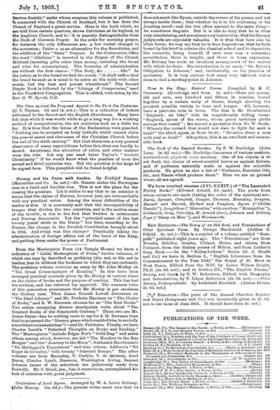From the Masterpiece Press (14 Temple House) we have a
collection of "Little Masterpieces of Prose," twelve volumes, of which one may be described as prefatory (21s. net, or 35s. net in leather, less is. without the bookcase in which they are enclosed). The prefatory volume contains an essay by Mr. John Morley. on "The Great Commonplaces of Reading." In this have been arranged practical counsels given by Mr. Morley at various times on the choice of books and the purpose of reading. This has had his revision, and has reeeived his approval. The common voice of this generation pronounces that Mr. Morley is par excellence the literary man. Then James Russell Lowell discourses on "The Ideal Library?" and Mr. Frederic Harrison on "The Choice of Books," and R. W. Emerson chooses for us "The Best Books." Two critics occupying diverse standpoints write about "The Greatest Books of the Nineteenth Century." These two are Mr. James Bryce—has he nothing more to say for J. H. Newman than that he possessed the "literary grace which enabled him to revivify a moribund ecclesiasticism"?—and Dr. Fairbairn. Finally, we have Charles Lamb's "Detached Thoughts on Books and Reading." The " Masterpieces " include Edgar Poe's " Gold-Bug " and seven others, among which, however, are not "The Murders in the Rue More" and the" Journey to tho Moon"; Nathaniel Hawthorne's "Dr. Heidegger's Experiment" and nine others; Addison's "Sir Roger do Coverley," with twenty "Selected Essays." The other volumes are from Macaulay, T. Carlyle, T. de Quincey, Lord Bacon, Charles Lamb, Emerson, Washington Irving, Samuel Johnson (some of the selections are judiciously made from Boswell). Mr. C. Stead, jun., has, it seems to us, accomplished his task of selection with great judgment.
Confessions of Lord Byron. Arranged by W. A. Lewis Bottany. (John Murray. 10s. 6d.)—The present writer must own that he










































 Previous page
Previous page